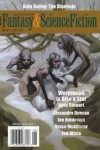Welcome back to “Know a Nominee,” the blog series that gives you inside access to this year’s Bram Stoker Award nominees. Today’s featured author is Dale Bailey, who’s nominated in the category of Superior Achievement in Long Fiction, for ‘The Bluehole’ (The Magazine of Fantasy & Science Fiction, May/June, 2013).
DM: Can you please describe the genesis for the idea that eventually became the work for which you’ve been nominated? In the case of a work wherein you’ve written multiple stories (like a collection) please choose your favorite part and discuss.
DB: I think it’s pretty hard to pin down the genesis of any idea—most of them brew themselves up out of the cultural soup we all live in, I think. But “The Bluehole” does have a couple of specific origins. There is, first of all, a real Bluehole by the railroad tracks in Princeton, WV, the town where I grew up. Unlike the lake of the story it is literally a hole—a pond of maybe forty or fifty yards in circumference, which wouldn’t give a lake monster much room to do his thing. But I also wanted to write about my youth in the late 70s and early 80s. In many ways, the story is an homage to the things I loved then (and now)—punk rock, The Thing, Starlog, Clifford Simak, all the allusions the story makes, all the things Jeremy learns to love.
DM: What was the most challenging part of bringing your idea to fruition? The most rewarding aspect of the process?
DB: The most challenging thing was putting myself back into that place—the early 80s, I mean—both culturally and emotionally. Adolescence, especially a difficult adolescence, is a fairly turbulent time and it’s not something I particularly wanted to experience again, but the story called for me to return to those days. Sometimes it was hard to summon them up again—not to recall them, but to revive them in a visceral kind of way, these old ghosts, and lay them finally to rest.
DM: What do you think good horror/dark fiction should achieve? How do you feel the work for which you’ve been nominated work fits into that ideal?
DB: Well, I think good dark fiction does lots of things, but for me the main thing is to move the reader and, hopefully, to cast light on some variety of experience they might not have otherwise encountered. It’s probably a sacrilege to say this, but I’m not particularly interested in scaring the reader. I can’t think of a book that has really scared me since I was a kid, but the ones that stick with me after all these years have all moved me in one way or another, some quite profoundly.
DM: I’m curious about your writing and/or editing process. Is there a certain setting or set of circumstances that help to move things along? Where do you often find yourself getting stuck, and why?
DB: Writing does not come easy to me. I seem to get stuck everywhere, which is maybe why I’m not very prolific. I will say that, unlike many writers I know, I do not write multiple drafts. I try to perfect each line as I go—the language is very important to me—and by the time I reach the end of any particular piece, I’ve gone over just about every line dozens of times.
DM: As you probably know, many of our readers are writers themselves. What is the most valuable piece of advice you can share with someone who may be struggling to make their way in this life?
DB: I never know how to answer this question, in part because there are so many answers. I guess the most valuable thing you can do is read widely. I think maybe the biggest mistake writers make is that they read solely in the genre they write in. I think you need to read everything you can lay hands on and it will all come back to you in richer ideas, more robust plots and characters, more striking prose. And of course, persevere. Always persevere.
DM: What are you most looking forward to at this year’s Bram Stoker Awards/WHC (if you are attending)? If not attending, what do you think is the significance of recognitions like the Bram Stoker Awards?
DB: I wish I could be at the awards ceremony. I really do. But life intervenes. As for the significance of the awards, I hate to fall back on cliché, but the recognition from your peers is especially gratifying. Writing stories often seems like beaming messages into space—you never know if anybody is reading them. To know that somebody is, and that they like them—well, it doesn’t get any better than that. As they say, it really is an honor to be nominated.
About Dale Bailey
Dale Bailey lives in North Carolina with his family, and has published three novels, The Fallen, House of Bones, and Sleeping Policemen (with Jack Slay, Jr.). His short fiction, collected in The Resurrection Man’s Legacy and Other Stories has been a three-time finalist for the International Horror Guild Award, a two-time finalist for the Nebula Award, and a finalist for the Shirley Jackson Award. His International Horror Guild Award-winning novelette “Death and Suffrage” was adapted for film by director Joe Dante as part of Showtime Television’s Anthology series, Masters of Horror. He has two books coming out next year, The End of the End of Everything: Stories and Acheron: A City in Seven Stories, both from Resurrection House.



